Article
Soldatova G.U., Teslavskaya O.I. (2019) Using digital technology in families with children of preschool and primary school age. National Psychological Journal, [Natsional’nyy psikhologicheskiy zhurnal], 12(4), 12–27.
Abstract
Background. The ubiquity of ICTs, the decrease in the age at which digital devices began to be used, the sensitivity of the periods of preschool and primary school age, the extremely high importance of parental position regarding the use of digital devices by young children, with insufficient scientific development of this problem, necessitates obtaining and analyzing empirical data on the use of digital technologies in Russian families with preschool- and primary school- aged children.
Objective. Investigation of the ICTs usage in families with children of preschool (5-7 years old) and primary school (8-11 years old) age.
Design. The at-home study (N=100 parental-child dyads) consisted of a semi-structured interview for preschoolers and questionnaires for primary school aged children and parents of both age groups. It included questions about the level of user activity, digital initiation and culture, digital competency, parental mediation, online risks, psychological well-being and parent-child relationships .
Results. On weekdays, two-thirds (62-64%) of children aged 5–11 spend max. 1 hour on the Internet, and the rest of them spend max. 3 hours. On weekends, 48% of children of 5–11 years old spend online 1–3 hours, with 8% of preschool children and 18% of primary school children spending >3 hours. 5–7 aged children mostly use tablets, while 7–11 olders prefer smartphones. In both age groups, the leading form of digital activity is watching cartoons and videos. Children’s digital games evolve from interest in interacting with objects to preference for role-playing games. 7–1 aged kids begin to explore social networks, and use the Internet for study. 46% of 5–7 year children (46%), and 60% of 8–11 aged children have encountered online risks. Technical and content risks (pop-up banners and videos, frightening and pornographic content, viruses) prevail. 12% of primary school students encounter communication risks as well.
Most parents of preschoolers (70%) choose a strategy of being nearby their child using the Internet. In families with 8–11 aged children, adults are more tend to purposefully educate their child to use online technologies. A third of all adults surveyed admit to being insecure in the issue of online safety.
Accepted: 12/12/2019
Pages: 12-27
DOI: 10.11621/npj.2019.0402
PDF: Download
Keywords: Internet; early schoolchildren; family; parents; online activity; digital technologies; electronic devices; smartphone; tablet; tv; mediation strategies; Online risks; digital competence;
Available Online 31.12.2019
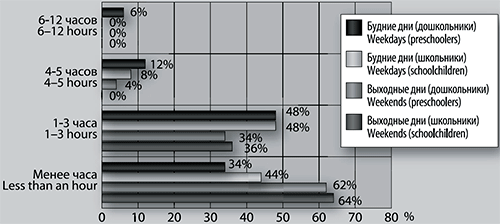
Fig. 1. Answers of parents to the question: “How much time does your child spend with digital devices on weekdays and weekends?”
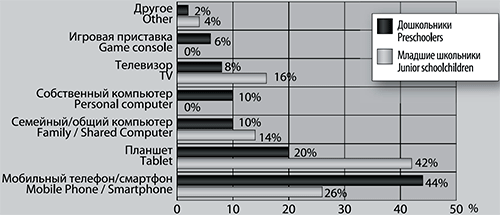
Fig. 2. Answers of parents of preschool children and primary school children to the question: “Which device is your child’s favourite?”
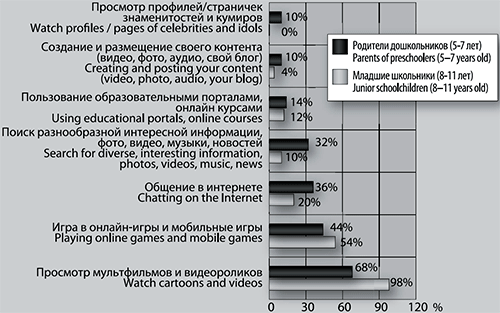
Fig. 3. Answers of preschoolers’ (5–7 years) parents and answers of primary school children to the question: “What does your child (you) most often do on the Internet? (3 answer options max)"
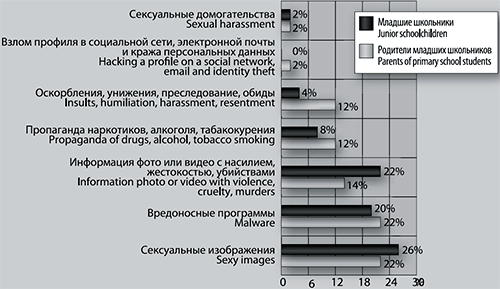
Fig. 4. Answers of preschoolers’ parents and primary school students to the question: “What problems have you encountered on the Internet over the past year?”
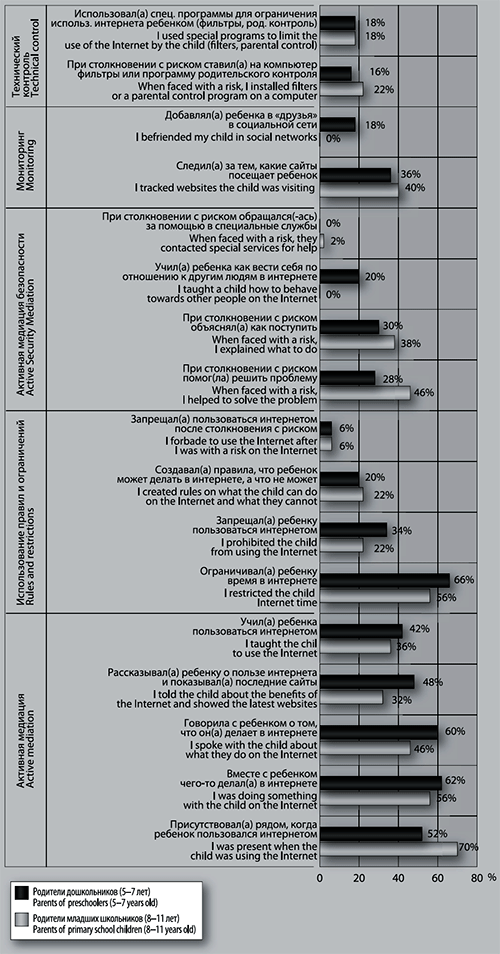
Fig. 5. Comparison of the frequencies of parental mediation strategies for using the Internet (parents of preschool children 5–7 years old and primary school children 8–11 years old, %).
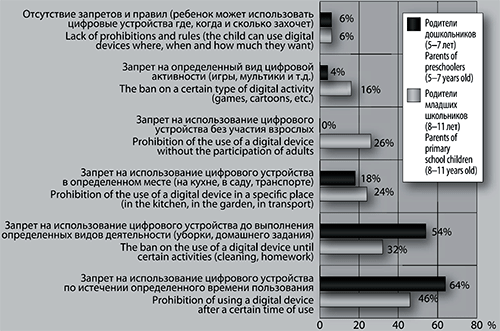
Fig. 6. Types of prohibitions set by parents when children use the Internet (%).
Acknowledgments
The study was supported by the Russian Foundation for Basic Research (Department of Humanitarian and Social Sciences) as part of the research project Generation Z: Information and Communication Technologies as a Cultural Tool for the Development of Higher Mental Functions, project 17-06-00762.
References:
(2016). American Academy of Pediatrics. Media and Young Minds. Pediatrics, 138(5). Retrieved from: https://pediatrics.aappublications.org/content/pediatrics/138/5/e20162591.full.pdf (accessed 04.11.2019). doi: 10.1542/peds.2016-2591
Anand, S., & Krosnick, J. (2005). Demographic predictors of media use among infants, toddlers and preschoolers. American Behavioral Scientist, 48(5), 539–556. doi: 10.1177/0002764204271512
Blum-Ross A. (2016). Livingstone S. Families and screen time: Current advice and emerging research. Media Policy Brief 17. London: Media Policy Project, London School of Economics and Political Science, 52.
Cespedes E.M., Gillman M.W., Kleinman K., & Rifas-ShimanS.L. et al. (2014). Television viewing, bedroom television, and sleep duration from infancy to mid-childhood. Pediatrics, 133(5), 1163–1171. doi: 10.1542/peds.2013-3998
Cheng S., Maeda T., Yoichi S., & Yamagata Z. et al. (2010). Early television exposure and children's behavioral and social outcomes at age 30 months. Journal of Epidemiology, 20, 482–489. doi: 10.2188/jea.JE20090179
(2018). Children and parents: Media use and attitudes report 2018. UK. Retrieved from: https://www.ofcom.org.uk/__data/assets/pdf_file/0024/134907/Children-and-Parents-Media-Use-and-Attitudes-2018.pdf (accessed 19.09.2019).
DeLoache J., Chiong S., Sherman K., & Islam. N et al. (2010). Do Babies Learn From Baby Media? Psychological Scienc, 21(11), 1570–1574. doi: 10.1177/0956797610384145
Federal state educational standards. Retrieved from: https://fgos.ru/
Ferguson J. (2010). The influence of television and video game use on attention, and school problems: A multivariate analysis with other risk factors controlled. Journal of Psychiatric Research, 45(6), 808–813. doi:10.1016/j. jpsychires.2010.11.010
Gentile D. (2009). Pathological video-game us among youth ages 8 to 18: A national study. Psychological Science, 20(5), 594–602. doi: 10.1111/j.1467-9280.2009.02340.x .
Golubev V.V. (2017). Sanitary and hygienic requirements for the conditions for organizing the work of children with a computer. [Osnovy pediatrii i gigiena detey rannego i doshkol'nogo vozrasta: uchebnoe posobie]. Moscow, Akademiya.
Hinkley T., Verbestel V., & Ahrens W., et al. (2014). IDEFICS Consortium. Early childhood electronic media use as a predictor of poorer well-being: a prospective cohort study. JAMA Pediatr, 168(5), 485–492. doi: 10.1001/jamapediatrics.2014.94
Hinkley,T., Brown, H., Carson, V., & Teychenne, M. (2018). Crosssectional associations of screen time and outdoor play with social skills in preschool children. PloS one, 13(4), 1–15. doi: 10.1371/journal.pone.0193700
Holloway D., Green L., & Livingstone S. (2013). Zero to eight. Young children and their internet use. LSE, London: EU Kids Online. Retrieved from: http://eprints.lse.ac.uk/52630/1/Zero_to_eight.pdf (accessed 06.11.2019).
Hosokawa R., & Toshiki K. (2018). Association between mobile technology use and child adjustment in early elementary school age. PLoS One, 13 (7), 1–17. doi: 10.1371/journal.pone.0199959
Information letter of the Ministry of Education of the Russian Federation as of May 25, 2001 #753 / 23-16 “On the Informatization of Preschool Education in Russia”. Garant. Retrieved from: https://base.garant.ru/1586576/ (accessed December 10, 2019).
Jago R., Stamatakis E., & Gama A., et al. (2012). Parent and child screen-viewing time and home media environment. Am J Prev Med., 43(2), 150–158. doi: 10.1016/j.amepre.2012.04.012
Kovess-Masfety V. et al. (2016). Is time spent playing video games associated with mental health, cognitive and social skills in young children? Social Psychiatry and Psychiatric Epidemiology, 51( 3), 349–357. doi: 10.1007/s00127-016-1179-6
Konca, A.S. & Koksalan, B. (2017). Preschool children‘s interaction with ICT at home. International Journal of Research in Education and Science (IJRES), 3(2), 571–581. doi: 10.21890/ijres.328086
Kuchma V.R. et al. (2015). Hygienic justification for the safe use of electronic tablets in the classroom of preschoolers. [Rossiyskiy pediatricheskiy zhurnal], 4, 51–55.
Letter of the Ministry of Education of the Russian Federation as of March 14, 2000 #65.23-16 “On hygiene requirements for the maximum load on preschool children in organized forms of education”. Garant. Retrieved from: https://base.garant.ru/6150419/ (accessed December 10, 2019).
Livingstone S., Haddon L., Gorzig A., & Olafsson K. (2011). Risks and safety on the internet: the perspective of Europеan children: full findings and policy implications from the EU Kids Online survey of 9-16 year olds and their parents in 25 countries. L.: EU Kids Online Network.
Nikolopoulou, K., Gialamas, V., & Batsouta, M. (2010). Young children's access to and use of ICT at home. Review of science. Mathematics and ICT Education, 4(1), 25–40.
Order of the Ministry of Education of the Russian Federation # 1155 as of October 17, 2013 “On the approval of the federal state educational standard for preschool education” November 22, 2013. Garant. Retrieved from: https://www.garant.ru/products/ipo/prime/doc/70412244 (accessed December 10, 2019).
Pecherskaya E.P., & Merkulova D.Yu. (2013). Preschoolers on the Internet. [Teoriya i praktika obshchestvennogo razvitiya], 10, 76–77.
Przybylski A., & Mishkin A. (2016). How the quantity and quality of electronic games relates to adolescents’ academic engagement and psychological adjustment. Psychology of popular media culture, 5(2), 145–146. doi: 10.1037/ppm0000070
Radesky J., Peacock-Chambers E., Zuckerman B., & Silverstein M. (2016). Use of Mobile Technology to Calm Upset Children: Associations With Social-Emotional Development. JAMA Pediatr, 170 (4), 397–399. doi: 10.1001/jamapediatrics.2015.4260
Roseberry S., Hirsh-Pasek K., GolinkoffR.M. (2014). Skype Me! Socially Contingent Interactions Help Toddlers Learn Language. Child Development, 85(3), 956–970. doi: 10.1111/cdev.12166
Schmidt M.E, Pempek T., Kirkorian H.L., Frankenfield A.L, & Anderson D.R. (2008). The Effects of Background Television on the Toy Play Behavior of Very Young Children. Child Development, 79 (4), 1137–1151. doi: 10.1111/j.1467-8624.2008.01180.x
Soldatovа G., Shlyapnikov V., & Olkina O. (2015). Young children (0-8) and digital techology. A qualitative exploratory study - National report – Russian Federation. Young children (0-8) and digital technology. Luxembourg: Publications Office of the EU, 410–437. Retrieved from: http://publications.jrc.ec.europa.eu/repository/handle/JRC93239 (accessed 06.11.2019)
Soldatova G., & Teslavskaia (Olkina) O. (2018). Young children (0-8) and digital technology. Russian Report. In Chaudron S., Di Gioia R., & Gemo M. Young children (0-8) and digital technology, a qualitative study across Europe, JRC 110359, EUR 29070 EN, Publications Office of the EU, Retrieved from: https://ec.europa.eu/jrc/en/publication/eur-scientific-and-technical-research-reports/young-children-0-8-and-digital-technology-qualitative-study-across-europe (дата обращения: 19.09.2019).
Soldatova G.U., & Vishneva A.E. (2019). Features of the development of the cognitive sphere in children with different online activities: is there a middle ground? [Konsul'tativnaya psikhologiya i psikhoterapiya, 27(3), 97–118. 10.17759/cpp.2019270307
Soldatova G.U., & Lvova E.N. (2018). Features of parental mediation in situations of collision of adolescents with online risks. [Psikhologicheskaya nauka i obrazovanie], 23(3), 29–41. doi: 10.17759/pse.2018230303
Soldatova G.U., & Rasskazova E.I. (2014). Psychological models of digital competence of Russian teenagers and parents. National Psychological Journal., 2, 27–35. doi: 10.11621/npj.2014.0204
Soldatova G.U., & Shlyapnikov V.N. (2014). Games, cartoons, study. [Deti v informatsionnom obshchestve], 17, 35–43.
Soldatova G.U., & Shlyapnikov V.N. (2015). The use of digital devices by preschool children. [Nizhegorodskoe obrazovanie], 3, 78–84. doi: 10.1093/litimag/imu041
Tomopoulos S., Dreyer B.P., Berkule S., & Fierman A.H., et al. (2010). Infant media exposure and toddler development. Archives of Pediatrics and Adolescence Medicine, 164(12), 1105–1111. doi: 10.1001/archpediatrics.2010.235
Wu C.S., Fowler C., Lam W.Y., & Wong H.T., et al. (2014). Parenting approaches and digital technology use of preschool age children in a Chinese community. Ital J Pediatr, 40–44. doi: 10.1186/1824-7288-40-44
Zimmerman F.J., Christakis D.A., & Meltzoff A.N. (2007). Associations between media viewing and language development in children under age 2 years. J Pediatr, 151(4), 364–368. doi: 10.1016/j.jpeds.2007.04.071
For citing this article:
Soldatova G.U., Teslavskaya O.I. (2019) Using digital technology in families with children of preschool and primary school age. National Psychological Journal, [Natsional’nyy psikhologicheskiy zhurnal], 12(4), 12–27.


